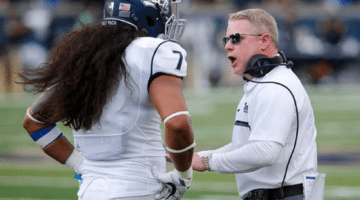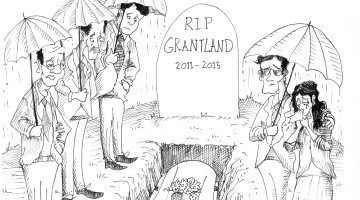
Photo courtesy of John Shearer. Former ESPN sportscaster Stuart Scott accepts Jimmy V award for Perseverance at the ESPY Awards at Nokia Theatre, in Los Angeles. Stuart died of cancer at the age of 49 on Jan. 4, 2015.
By Michael Bradley
Every morning I would wake up to hear ESPN sports anchor Stuart Scott’s signature slogan, “Boo-yah!” after a highlight. I woke up on the morning of Jan. 4, 2015 to find out I would never hear that voice again.
Anchor Hannah Storm came on the set of SportsCenter that morning with shivering lips and watery eyes.
“I regret to inform you that our colleague, Stuart Scott, has passed away.”
I sat there for a second that morning, just speechless. It was a loss for everyone. His friends, his fans, and most importantly, his family. He brought happiness wherever he was and through whatever he did.
Growing up, I wasn’t really sure what I wanted to do for the rest of my life. Since Kindergarten, adults had always asked me, “What do you want to be when you grow up?” Truth was I didn’t have the first clue. It took a death of this magnitude for me to figure out that I needed to be around sports for rest of my life somehow, some way. More importantly though, it taught me that Stuart Scott was the kind of man I want to be.
I’ve noticed throughout the years of my young life that the people who do their jobs without optimism, without innovation and without passion, don’t get remembered. The few people that have the courage to change the way things are done are the ones that live on forever. It’s not very often that somebody comes around and changes the entire landscape of their occupation. Stuart Scott did it simply by being himself.
Sports journalism, for years, was just like any other type of journalism: quite simply, telling the news. Many times, sports anchors would use little to no emotion to get the word out. That style took a backseat when Stuart Scott, a fast paced, charismatic anchor from North Carolina, came to the ESPN news team in 1993, after a few stints at local news stations. Scott started out on ESPN’s secondary channel, ESPN 2. He used an unprecedented style consisting of catchphrases and incorporated pop culture, which was never before used in sports journalism in such an exciting way. Viewers gravitated towards him as we quickly realized he was on to something.
“Call him butter because he’s on a roll!”
His popularity skyrocketed with catchphrases like this shortly after his debut on ESPN 2’s SportsSmash. In just a few years, Scott became a regular on ESPN’s flagship program, SportsCenter. Scott also hosted on-site coverage when Monday Night Football moved to ESPN in 2006. He was named the studio host of NBA on ESPN in 2002 and became the lead host of ABC’s NBA coverage in 2008. Scott also covered the NBA Finals from 1997 to 2014, interviewing the likes of greats such as Michael Jordan, Dwyane Wade, and Kobe Bryant. His growing fanbase allowed him to appear in multiple This is Sportscenter commercials as well.
“Stu” became somebody the sports world
could always count on to own the spotlight with sports’ biggest names and events. That morning, I reminisced on all the larger than life sports moments that he was a part of. I thought back to all the NBA Finals where Kobe Bryant was named the Finals MVP. Or the first time I heard the name “Durantula.” or when Lebron James “decided to take his talents to South Beach.” Each of those times, Stuart Scott was there, being himself.
The sports journalism world was in the palm of Stu’s hand by the early 2000s, and all of us sports fans were living in it.
Many people assume he was just an inspiration to the African-American demographic, but his catchphrases, his charisma and his passion spoke to all viewers, no matter what race. That is what separated Stuart Scott from other anchors the most: his ability to truly entertain ANYONE who tuned in to get the inside scoop in sports on any particular day.
When all was going well for Scott, a medical scare put fans in fear when they found out he was having some complications in late 2007 that would require him to take some time away from TV.
During a trip to a Monday Night Football game in Pittsburgh that year, Scott suffered a minor stomach ache. After the stomach ache became more and more painful, he skipped out on the game for a hospital visit. Doctors were forced to perform an appendectomy and later discovered that Scott had pancreatic cancer. A huge blow to a sports world that was in love with Stu.
“One of the coolest things about having cancer, and I know that sounds like an oxymoron, is meeting other people who’ve had to fight it,” Scott said. “You have a bond. It’s like a fraternity or sorority.”
It was an optimistic outlook like this that got Stu through his first bout with cancer, but he was once again diagnosed with cancer in 2011. It eventually went back into remission as well. Stuart Scott showed us that cancer is beatable, and even when times could be better, don’t give up. Don’t ever give up.
Scott was diagnosed with cancer for the final time on January 14, 2013. He started to do mixed martial arts after his chemotherapy sessions, along with a P90X workout regimen. He didn’t let his medical issues get in the way of his work life and constantly told his colleagues he wanted to focus on his job, not to worry about him. Scott decided to switch to chemotherapy pills in 2014 after 58 radiation sessions. He never wanted to know what stage he was in during any of his battles with cancer.
Stuart Scott was named the 2014 recipient of the Jimmy V Perseverance Award during the ESPYs Award Ceremony on July 18 of that year. This award is given to an individual that has shown courage through the rigorous obstacles they are facing in their life. The award was first presented to Jim Valvano, a basketball coach and broadcaster who suffered from cancer as well. It was during that speech when Stu opened the world’s eyes to see things in a completely different way.
“When you die, that does not mean you lose to cancer,” Scott said. “You beat cancer by how you live, why you live and the manner in which you live.”
He called his daughters to the stage and gave them great, big hugs showing the world the amount of love he had for them.
Stuart Scott showed the world that by doing what you love, believing in yourself, and doing it with it absolute passion, the sky’s the limit.
I’ve seen people already in my college career that are trying to be somebody who they are not by going after the money. Some students are looking over the fact that they could end up living a life without true happiness in a career where they can’t put in 110 percent effort and passion. I thought I might make the same mistake until Stuart Scott passed away.
I took a step back after Stu’s death to ask myself what kind of person I wanted to be and what would I love to do for the rest of my life. It took awhile for me to figure out, but after long nights of pondering, I felt in my heart that being a sports journalist would make me happier than anything. Stuart Scott was the main reason for my career choice. All my life, I watched how he worked and I’ve never seen anybody with a burning desire like his to pour out passion for colleagues, fans, friends, and family. If I could be half the man he was, I will consider myself successful.
Now it’s a year later and I still miss hearing him say, “Call him the Windex Man because he’s cleanin’ up the glass!” But it’s not all bad because I couldn’t be more satisfied with my choice to pursue sports journalism. Without the loss of Stu, I would have still been clueless about my future and missing out on the great opportunities that journalism has presented me.
When we look back on Stuart Scott’s life, we’ll remember him for that swagger, that charisma, and that little extra something he brought to sports journalism, but what took him to a tier that nobody else has been on, was his drive to be the best and to have the determination to start a movement that will forever change how we view our sports news. For any aspiring sports journalists out there, I hope Stuart Scott moved you as much as he moved me, and that he will continue to motivate you to better yourself in how you live, why you live, and the manner in which you live.
Your legacy will live on, Stu. Booyah!
Michael Bradley can be reached at neil@sagebrush.unr.edu and on Twitter @SagebrushSports












